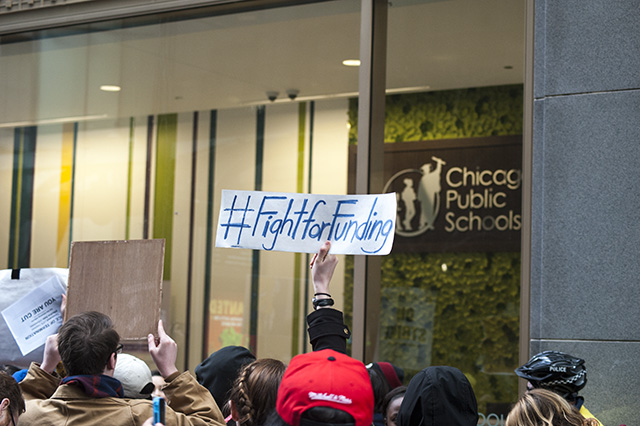Moody's Suggests CPS Seek New Taxes, Maybe Even Declare Bankruptcy
By Stephen Gossett in News on Jan 13, 2017 10:50PM

Demonstrators in front of Chicago Public Schools headquarters on Madison Street during the Chicago Teachers Union "day of action" on April 1, 2016. Photo by Aaron Cynic.
Recommendations to ensure the solvency of Chicago Public Schools rarely come in the form of small, easily digestible measures. To wit, the latest suggestions from a major Wall Street credit agency are again the definition of bitter-tasting medicine: either (another) major property tax levy or avoiding pension payments to teachers’ pensions. A third, nuclear option is particularly audacious: the district could declare bankruptcy.
Of the three “painful” options put forth on Thursday by Moody’s, the only one with any kind of likelihood, however remote, is the tax hike, which would generate an additional $400 million each year in added tax burden, according to the agency's reports. Some state funds currently go toward CPS debt. The tax hike would be intended to take their place.
But Chicago Public Schools does not appear thrilled with any of the three options. A spokesperson said CPS is already managing its debts despite Gov. Bruce Rauner’s previous veto of the $200-plus million pension aid.
“CPS continues to make substantial progress, eliminating a billion dollar budget deficit in the past 18 months through management efficiencies and new revenue,” Emily Bittner, CPS Director of Communications, told Chicagoist by email. “Despite Gov. Rauner's veto of pension dollars for Chicago that every other school district receives, CPS will maintain a balanced budget this year, even as we continue to fight for Gov. Rauner to fix the nation's most discriminatory school funding system.”
CPS isn't alone in their subtle shade. As WBEZ notes, Rahm Emanuel has been known to throw cold water in the past on Moody's and, in the mayor's estimation, their unfair perception of the city and its finances. “It has become increasingly clear that Moody’s rating methodology and agenda are far from objective and independent,” Emanuel wrote last month. “This is not to say that the City should be rated AAA, but… your current rating does not accurately reflect the City’s credit or our ability to pay debt service when due.”
The Moody’s report itself also notes that a property-tax increase would negatively impact the City Council’s future ability to adjust taxes to target other city funding issues.